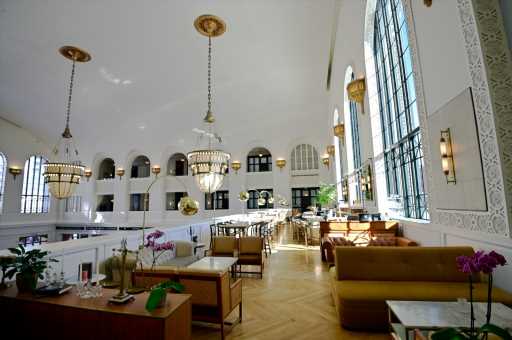Colorado’s boutique hotels foresee bright future after COVID-19 chaos
Before the coronavirus pandemic, the number of boutique hotels in Colorado was growing, with funky and eclectic properties opening up in the Denver area and in tourism-focused communities in the mountains.
Then COVID-19 came along, stalling growth and plans for the entire hospitality industry. The hotel industry suffered its “most devastating year on record” in 2020, as travel slammed to a standstill and more than 670,000 hotel industry jobs vanished nationwide, according to the American Hotel and Lodging Association.
But that turned around last year, as travel-starved guests emerged from quarantine. The development of vaccines and “consumer optimism” led to a boost in demand in 2021, which is expected to continue into this year, AHLA and Accenture predicted in a recent report. In 2022, occupancy rates and room revenue are predicted to nearly rebound back to 2019 levels, Oxford Economics estimates.
The boutique hotel sector is specifically seeing expansion, accounting for almost 5,500 hotels across the U.S. – a 7.7% jump compared to 2021, said Christian E. Hardigree, dean of the Metropolitan State University of Denver’s School of Hospitality. The pandemic has driven travelers toward the boutique market, which is expected to rake in $16.9 billion in revenue this year, she added in a phone interview.
“People are like, ‘Hey, it’s a smaller facility. I’m not dealing with thousands of people,’ ” Hardigree said. “I feel safer and more in control of my environment.”
Almost two years after COVID-19 began its spread, Henning Rahm, regional general manager for both Limelight Hotel Aspen and Snowmass, sees a silver lining for his sector: It “created an über-amount of demand.”
“We see a cancellation come in, and almost two new requests for the same time frame,” Rahm added in a phone interview.
He pointed to plenty of pandemic-related problems, including supply-chain issues that left a facility renovation unfinished by its deadline. His company has also taken the step of requiring proof of COVID-19 vaccinations for employees and guests — not an industry standard in the U.S. but something that hotels in other parts of the country are doing.
Boutique hotels fall under different style categories and offer “curated” experiences. Mustafa Menekse, director of sales and marketing at The Maven, personally considers a boutique hotel as one with “no brand behind it,” like Marriott International Inc., or Hilton Worldwide Holdings Inc. “We basically create all of the amenities from scratch, and tailor towards our audience.”
The Maven opened in April 2017 in downtown Denver’s Lower Downtown neighborhood. It’s situated in Dairy Block, a micro-district that once housed Windsor Dairy, which lets The Maven’s team offer guests “an urban experience,” Menekse said in a phone interview.
“A true boutique, independent hotel doesn’t answer to any corporate brand,” said Ed Blair, area general manager of The Oxford Hotel in LoDo and The Crawford Hotel above Denver Union Station. A former Marriott employee, Blair’s been an industry fixture since 1989. “We get to decide what our brand is, and change that by the hour if we so choose.”
The two hotels tie luxury with history, he added, pointing to The Oxford’s recent 130th anniversary. Travelers are “looking for something that’s got heart and soul,” particularly after the pandemic boxed them into their homes, Blair said.
COVID-19 temporarily shuttered the doors of his hotels and that led to difficult staffing decisions in 2020. “To look in the eyes of 60 people that you love and care for and lay them off or put them on furlough was definitely the most painful and difficult professional experience I’ve ever had,” Blair said.
Related Articles
5 Denver hotel and office projects on track to be completed in 2022
8 new Colorado hotels worth planning a vacation around this summer
As business trickles back, hotels compete on cleanliness
However, last year went “exceptionally well” for both The Crawford and The Oxford, he said, with their performance nearing that of 2019. “We expect to see a great recovery in 2022,” with group business and corporate travel hopefully returning, Blair added.
Because of the growing popularity of boutique hotels, Don Swedberg, general manager of Kimpton Hotel Monaco Denver located downtown, said industry giants have attempted to shift toward the boutique style over the past decade. “A lot of my career, I spent it with big, major brands, and they can be stuffy and uptight,” said Swedberg, a 30-year industry veteran who joined Hotel Monaco’s team in 2019.
However, the Kimpton Hotel & Restaurant Group LLC is an industry powerhouse in its own right, with 75 open hotels and 32 under development, as of Sept. 30. The group claims it “first introduced the boutique concept” to the U.S. on its website, and Swedberg calls Hotel Monaco the first boutique hotel in Denver when it opened in 1998.
Boutique hotels let guests and staff “be a little bit quirky,” he added in a phone interview. Swedberg pointed to their partnership with Colorado-based Lifeline Puppy Rescue, which brings puppies into the hotel to socialize them.
Candace Duran, director of sales and marketing at HALCYON, a hotel in Cherry Creek, highlighted the small touches that enhance a traveler’s stay, such as rooftop telescopes and complementary access to the Denver Botanic Gardens.
Guests are “really wanting to spend for an experience,” she said, with the pandemic only encouraging that attitude.
“People did not balk at rates. They were ready to travel,” said Duran, who’s worked at HALCYON for almost five years. “Every weekend, we were sold out, almost,” during the summer months of 2021.
Given the hotel’s success in bouncing back from the pandemic’s initial impact, she looks forward cautiously: “This next year – because it was so great last year – is a little scary.”
Source: Read Full Article





